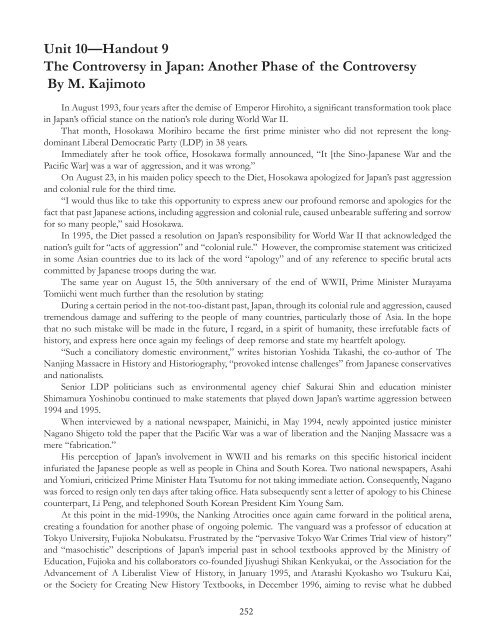Download - Canada ALPHA
Download - Canada ALPHA
Download - Canada ALPHA
Create successful ePaper yourself
Turn your PDF publications into a flip-book with our unique Google optimized e-Paper software.
Unit 10—Handout 9<br />
The Controversy in Japan: Another Phase of the Controversy<br />
By M. Kajimoto<br />
In August 1993, four years after the demise of Emperor Hirohito, a signifi cant transformation took place<br />
in Japan’s offi cial stance on the nation’s role during World War II.<br />
That month, Hosokawa Morihiro became the fi rst prime minister who did not represent the longdominant<br />
Liberal Democratic Party (LDP) in 38 years.<br />
Immediately after he took offi ce, Hosokawa formally announced, “It [the Sino-Japanese War and the<br />
Pacifi c War] was a war of aggression, and it was wrong.”<br />
On August 23, in his maiden policy speech to the Diet, Hosokawa apologized for Japan’s past aggression<br />
and colonial rule for the third time.<br />
“I would thus like to take this opportunity to express anew our profound remorse and apologies for the<br />
fact that past Japanese actions, including aggression and colonial rule, caused unbearable suffering and sorrow<br />
for so many people,” said Hosokawa.<br />
In 1995, the Diet passed a resolution on Japan’s responsibility for World War II that acknowledged the<br />
nation’s guilt for “acts of aggression” and “colonial rule.” However, the compromise statement was criticized<br />
in some Asian countries due to its lack of the word “apology” and of any reference to specifi c brutal acts<br />
committed by Japanese troops during the war.<br />
The same year on August 15, the 50th anniversary of the end of WWII, Prime Minister Murayama<br />
Tomiichi went much further than the resolution by stating:<br />
During a certain period in the not-too-distant past, Japan, through its colonial rule and aggression, caused<br />
tremendous damage and suffering to the people of many countries, particularly those of Asia. In the hope<br />
that no such mistake will be made in the future, I regard, in a spirit of humanity, these irrefutable facts of<br />
history, and express here once again my feelings of deep remorse and state my heartfelt apology.<br />
“Such a conciliatory domestic environment,” writes historian Yoshida Takashi, the co-author of The<br />
Nanjing Massacre in History and Historiography, “provoked intense challenges” from Japanese conservatives<br />
and nationalists.<br />
Senior LDP politicians such as environmental agency chief Sakurai Shin and education minister<br />
Shimamura Yoshinobu continued to make statements that played down Japan’s wartime aggression between<br />
1994 and 1995.<br />
When interviewed by a national newspaper, Mainichi, in May 1994, newly appointed justice minister<br />
Nagano Shigeto told the paper that the Pacifi c War was a war of liberation and the Nanjing Massacre was a<br />
mere “fabrication.”<br />
His perception of Japan’s involvement in WWII and his remarks on this specifi c historical incident<br />
infuriated the Japanese people as well as people in China and South Korea. Two national newspapers, Asahi<br />
and Yomiuri, criticized Prime Minister Hata Tsutomu for not taking immediate action. Consequently, Nagano<br />
was forced to resign only ten days after taking offi ce. Hata subsequently sent a letter of apology to his Chinese<br />
counterpart, Li Peng, and telephoned South Korean President Kim Young Sam.<br />
At this point in the mid-1990s, the Nanking Atrocities once again came forward in the political arena,<br />
creating a foundation for another phase of ongoing polemic. The vanguard was a professor of education at<br />
Tokyo University, Fujioka Nobukatsu. Frustrated by the “pervasive Tokyo War Crimes Trial view of history”<br />
and “masochistic” descriptions of Japan’s imperial past in school textbooks approved by the Ministry of<br />
Education, Fujioka and his collaborators co-founded Jiyushugi Shikan Kenkyukai, or the Association for the<br />
Advancement of A Liberalist View of History, in January 1995, and Atarashi Kyokasho wo Tsukuru Kai,<br />
or the Society for Creating New History Textbooks, in December 1996, aiming to revise what he dubbed<br />
252


